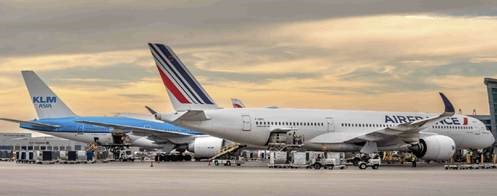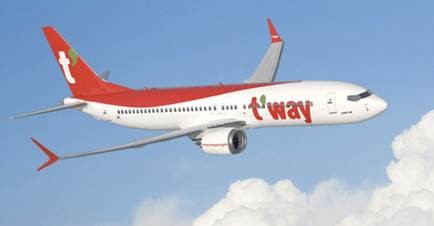엑스트란스 - 항공 물류 업데이트 - 09주차 블로그
항공화물 General
1) Polar Air cargo 운항 중단으로 글로벌 항공화물 시장 변화는 ?

- 아틀라스 항공은 이번에 기존의 합작사 모델에서 벗어나 독립적인 사업 운영에 집중할 계획이라고 밝혔지만, 기존 상업용 항공화물 공급시장에 상당한 비중을 차지했던 폴라항공의 사실상 단항은 시장에 미치는 영향이 적지 않을 것으로 전망.
- 특히 DHL과의 이른바 협업(?)이 중단되면서, 그동안 DHL을 통해 소화했던 화물 스페이스를 어떻게 운용 및 활용할 것인지를 두고 정확한 시장 전략이나 방향이 공개되지 않고 있어, 이를 단순히 항공사 지배주주사간의 결별 수준으로만 해석할 수 없는 상황.
- 먼저, 아틀라스 항공은 세계 최대의 보잉 747 화물기 운영사로, DHL과의 폴라 에어카고 합작 해체는 전략적 방향성 변화의 일환이라고 밝히면서 각 사의 발전 방향을 고려한 결과, 합작 모델이 더 이상 양사의 전략적 목표에 부합하지 않는다는 결론에 도달했기 때문이라고 배경을 설명.
- 특송 서비스 시장의 입장에서는 폴라 에어카고는 정기 익스프레스 항공 서비스를 제공하는 기업으로, 아틀라스 항공이 항공기를 운영하고 DHL이 주요 화물 공간을 확보하는 방식으로 운영되어았음. 이에 따라 이번 해체 결정에 따라 아틀라스 항공은 기존 합작사를 통해 운영되던 일부 인력과 시설을 자체적으로 흡수할 예정이며, 나머지는 DHL 측으로 이전될 예정.
- 다만 아틀라스 항공은 여전히 폴라 에어카고의 항공운항증명(AOC)을 유지하지만, 폴라의 항공기는 현재 운항하지 않고 있는 상태인 것으로 알려지고, 아틀라스 항공은 폴라 에어카고를 통해 DHL에 제공하던 보잉 747-8 화물기 4대를 회수하여 새로운 고객사와의 전용 화물 운송 계약에 투입할 계획.
- 반면, DHL은 합작사에서 운영되던 보잉 777 화물기 2대를 직접 운영하면서도, 기존처럼 아틀라스 항공의 승무원과 유지보수 서비스를 활용할 예정.
- 이와 같은 변화는 아틀라스 항공이 단순한 항공기 임대 및 운영사에서 벗어나 직접 고객과 계약을 맺고 독립적인 비즈니스 모델을 구축하려는 전략적 변화의 일환. 지난해 아틀라스는 아마존과의 계약을 종료하고, 중국 전자상거래 기업인 쉬인(Shein)과 티무(Temu)와의 협력을 강화하는 등 장거리 노선과 전자상거래 중심의 항공운송 서비스에 집중.
- 시장 환경 변화 관점에서, 아틀라스 항공과 DHL의 합작 해체는 글로벌 항공화물 시장이 빠르게 변화하고 있음을 보여줌. 기존의 정기편 중심의 운영 방식에서 벗어나, 보다 유연한 항공화물 네트워크 구축과 전자상거래 시장 대응이 항공사들의 핵심 전략으로 자리 잡고 있기 때문.
- 아틀라스 항공은 최근 싱가포르 기반의 글로벌 지상조업 기업 WFS(Worldwide Flight Services)와 협력해 전자상거래 및 고부가가치 화물의 처리 역량을 강화할 계획
- DHL 역시 연료 효율성과 탄소 배출 저감 목표에 맞춘 항공기 운영 최적화에 집중하고 있으며, 향후 더욱 친환경적인 항공기 도입 및 운영 방식 전환이 예상된다.
2) “중국 춘절 이후 미주행 화물기 운항편 감소 인유는 대 중국 관세 정책 영향

- 중국의 새해 춘절연휴가 끝난 지 2주가 지났지만, 중국발 미주행 화물기 운항 횟수는 여전히 회복되지 않고 있는데,. 이는 미국의 대중국 관세 도입과 ‘디 미니미스’(de minimis) 면세 기준 변경 이슈가 항공화물 시장에 영향을 미친 것으로 보여짐.
- 최근 글로벌 공급시장 분석기관인 Ratate의 수석 컨설턴트인 Tim van Leeuwen 부사장은 자신의 Linkedin 을 통해서 아시아-미국 간 화물기 운항이 중국 춘절 이전 대비 15% 미만으로 감소했으며, 이는 하루 평균 12편의 운항편수가 줄어든 수치. 이는 24대의 화물기가 다른 시장으로 이동했음을 의미한다는 것.
- 다만 Tim van Leeuwen Rotate 컨설팅 부문 부사장은 “이같은 감소세는 미국의 대중국 관세 영향일 가능성이 있지만, 밸런타인데이 화물 수요가 겹치는 시기에 발생해 정확한 분석이 어렵다”고 설명.
- 네트워크 항공사는 빠르게 회복해 춘제 이전 47편에서 45편으로 소폭 감소한 반면, 전세기 및 통합물류업체(Integrators) 운항은 상대적으로 큰 폭으로 감소.
- 정리하면, 전세 항공사(차터 항공사)는 춘절 이전 하루 24편 → 18편 (-25%, 12대 감편)했고, 통합물류업체(Integrators)는 하루 18편 → 14편 (-22%, 8대 감편).
- 이는 미국의 대중국 관세 영향의 전조일 가능성이 있으며, 차터기 항공사들의 감편 폭이 가장 크다는 점에 주목해야 한다는 지적. 무엇보다도, 디미니미스 정책 변화가 항공화물 공급망에 미치는 영향이 적지 않을 것임을 시사한 것.
3) 에어프랑스-KLM 마틴에어 카고, 트리플 크라운과 파트너십 체결

- 에어프랑스-KLM 화물운송부문 마틴에어 카고가 트리플 크라운과 국내 콘솔사와의 첫 지속 가능한 항공 연료(SAF) 파트너십을 체결.
- 트리플 크라운은 2020년 설립한 항공 화물 운송 선도 기업. 창고 운영부터 항공 수출, 항공 차터 서비스, 통관 및 배송까지 원스톱 토털 서비스를 제공.
- 설립 초기임에도 불구하고 국내에서 두 번째로 큰 규모의 콘솔사로 자리매김했으며, 업계 상위 3위 내 기업으로 성장.
- 18일 서울 중구 주한네덜란드대사관에서 열린 SAF 프로그램 파트너십 체결식에는 베아트리스 델퓨 에어프랑스-KLM 마틴에어 카고 한국·일본 지역 본부장, 페이터 반 더 플리트 주한네덜란드대사, 박천길 트리플 크라운 대표이사 등 주요 관계자들이 참석.
- SAF 프로그램은 에어프랑스-KLM 마틴에어 카고가 지난 2020년 도입한 친환경 프로그램. 전 세계 물류 업체 및 화주들이 일부 항공편에 SAF를 혼합해 운행할 수 있도록 지원.
- 참여 기업은 항공 화물 운송 과정에서 발생하는 탄소 배출량을 추정한 후, 원하는 규모의 기여금을 지원할 수 있는데, 에어프랑스-KLM 마틴에어 카고는 기여금이 SAF 조달에 사용될 수 있도록 운영 현황을 공개.
- 이번 파트너십을 통해 트리플 크라운은 기존 화석 연료 대비 최소 65%의 탄소 배출량 감축 효과를 기대할 수 있다.
- 베아트리스 델퓨 에어프랑스-KLM 마틴에어 카고 한국·일본 지역 본부장은 “국내 콘솔사와의 첫 SAF 파트너십을 트리플 크라운과 체결하게 돼 매우 기쁘다”며 “이를 바탕으로 환경 발자국을 줄이고 항공 화물 운송 업계 내 지속 가능성을 높일 수 있도록 노력하겠다”고 말함.
- 박천길 트리플 크라운 대표이사는 “올해 지속 가능한 화물 운송 모델을 구축하고자 ESG 경영 강화에 박차를 가할 계획”이라며 “에어프랑스-KLM 마틴에어 카고와의 SAF 파트너십 체결을 시작으로 지속 가능한 변화를 만들고, 더 많은 기업들이 이 노력에 동참할 수 있도록 독려할 것”이라고 전언. .
4) 대명소노, 티웨이홀딩스 통해 티웨이항공 지배하나

- 리조트 1위 대명소노그룹이 국내 2위 LCC인 티웨이항공을 인수하기 위해, 티웨이항공 현재 실질 소유주인 예림당의 제안(티웨이홀딩스 인수건)을 받아들이지 주목. 현재 티웨이항공은 ‘예림당 → 티웨이홀딩스 → 티웨이항공’ 순으로 지배구조가 형성되어 있는데, 예림당측은 “티웨이항공을 인수하려면 모회사인 티웨이홀딩스를 사가라”는 입장.
- 업계에서는 지난 17일 대명소노측이 티웨이항공을 상대로 낸 주주명부 열람·등사 가처분 신청을 취하한만큼, 대명소노측이 예림당 안을 받아들이며 경영권 분쟁을 종결시킬 것이라 예상.
- 예림당측은 티웨이홀딩스 경영권을 인수하라는 입장이었고, 대명소노는 티웨이항공 지분만 인수하겠다는 입장이었던 것으로 전해짐.
- 현재 티웨이홀딩스와 티웨이항공 모두 코스피 상장사인데, 티웨이홀딩스 예림당 및 특수관계인 지분이 46.91%. 티웨이항공은 예림당·티웨이홀딩스 및 특수관계인 지분이 30.06%이고, 대명소노측이 2대 주주(26.77%) 지분 보유 .
- 예림당 측은 세금을 절세하고 매각가를 높이기 위해, 예림당·티웨이홀딩스가 보유한 실질적인 티웨이항공 지분가치까지 얹어서 티웨이홀딩스를 사가라는 입장인 것으로 알려짐. 예림당의 현재 티웨이홀딩스 지분가치 몫 대비 약 3~4배 수준.
- IB업계 관계자는 “웃돈을 주고서라도 티웨이홀딩스를 사면서 티웨이항공 경영권을 가져가라는 게 예림당측 요구”라고 설명. 최근 양측간 소송전이 취하되면서, 결국 대명소노가 예림당측 의견을 받아들이는 것이라는 전망

top



